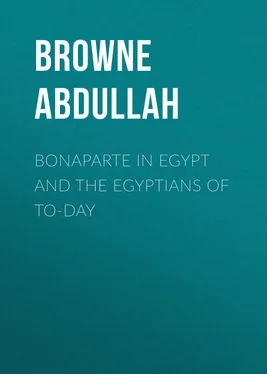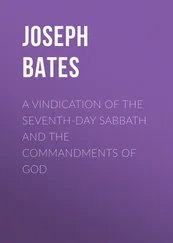Abdullah Browne - Bonaparte in Egypt and the Egyptians of To-day
Здесь есть возможность читать онлайн «Abdullah Browne - Bonaparte in Egypt and the Egyptians of To-day» — ознакомительный отрывок электронной книги совершенно бесплатно, а после прочтения отрывка купить полную версию. В некоторых случаях можно слушать аудио, скачать через торрент в формате fb2 и присутствует краткое содержание. Жанр: Историческая проза, foreign_antique, foreign_prose, foreign_language, на английском языке. Описание произведения, (предисловие) а так же отзывы посетителей доступны на портале библиотеки ЛибКат.
- Название:Bonaparte in Egypt and the Egyptians of To-day
- Автор:
- Жанр:
- Год:неизвестен
- ISBN:нет данных
- Рейтинг книги:4 / 5. Голосов: 1
-
Избранное:Добавить в избранное
- Отзывы:
-
Ваша оценка:
- 80
- 1
- 2
- 3
- 4
- 5
Bonaparte in Egypt and the Egyptians of To-day: краткое содержание, описание и аннотация
Предлагаем к чтению аннотацию, описание, краткое содержание или предисловие (зависит от того, что написал сам автор книги «Bonaparte in Egypt and the Egyptians of To-day»). Если вы не нашли необходимую информацию о книге — напишите в комментариях, мы постараемся отыскать её.
Bonaparte in Egypt and the Egyptians of To-day — читать онлайн ознакомительный отрывок
Ниже представлен текст книги, разбитый по страницам. Система сохранения места последней прочитанной страницы, позволяет с удобством читать онлайн бесплатно книгу «Bonaparte in Egypt and the Egyptians of To-day», без необходимости каждый раз заново искать на чём Вы остановились. Поставьте закладку, и сможете в любой момент перейти на страницу, на которой закончили чтение.
Интервал:
Закладка:
As to the Ulema, fully recognising the insincerity of the Mamaluks, they were fain to accept their homage as the only course for them to follow except one of open hostility, which, however little they, as a body, need fear its results, to each one individually involved risks not lightly to be run.
Having no power of excommunication, such as that possessed by the priests of the Catholic Church or the Brahmins, the Ulema had no direct means of coercing those who displeased them, and were thus not infrequently obliged to accept or adopt a line of conduct that under other circumstances they would have refused to follow. It is, therefore, to their credit that throughout the history of their class, they have always been an independent and, on the whole, a fearless set of men, and that it is but rarely indeed they have been opposed to reason or right as they have understood it, though, unhappily, their conceptions of these have not always been such as enlightened minds could approve. Like the clergy of all Churches, with, perhaps, the exception of the Catholic, they have not seldom been compelled to choose between interest and principle. That they should never err in such a case, they must have been more than human.
Diverse as were the interests of the Beys and those of the Ulema at this Council, the aims and hopes of the two classes were in the most perfect accord, both being dominated by the single desire to concert such measures as should seem best for the protection of the country.
In this they were heartily joined by Bekir Pacha. As the representative of the Sultan's authority, his chief duty and personal interest lay in seeing that the annual remittances to the Sultan were made as early and as large as possible, and that the country was kept as free from wars and seditions as might be. So long as he could in some fair measure secure these aims, though always, like all servants of the Empire, at the mercy of intriguing aspirants, he might hope to retain, if not his post, at least the Sultan's favour. Although thus constrained to court the goodwill of both the Beys and of the Ulema, his personal sympathies were strongly with the latter, and were not weakened by his keen sense of the treacherous nature of the friendship for himself and of the loyalty to the Empire professed by the former.
The relations thus existing between the three parties at the Council – the one-man party of Bekir Pacha, and those of the Mamaluks and Ulema – had then been in force for some years, and, coupled with the fact that Ibrahim Bey was a man who, though of approved courage, was withal a constant promoter of peace and concord, had contributed not a little to gain for the people the few years of comparative immunity from care and trouble they had been enjoying.
Murad Bey was a man of different stamp. Of great energy, proud and ambitious, ever ready to sacrifice friends as well as foes for his own profit, he is said to have been at times daring to foolhardiness, and again timid to poltroonery, but always consistently selfish, grasping, and tyrannical. From the time that he and Ibrahim Bey had agreed to work together in the government of the country they had shared between them the greater part of the revenue; and Murad, while constantly adding to his private property large areas of land confiscated from the people under various pretexts, spent large sums of money in developing the military resources at his disposal, constructing cannon, storing ammunition, and building vessels for military service on the Nile. Passionate, impulsive, and keenly conscious of the fact that the Sultan looked upon him and his fellow-Mamaluks with no friendly eye, upon hearing of the arrival of the French he jumped to the conclusion that they had come, if not as the allies of the Sultan, yet with his connivance. For Bekir Pacha, both as an individual and as the Sultan's representative, he had a contempt that, though veiled under the courtesy of pretended amity, lost no opportunity of wounding his feelings or depreciating his authority. Swayed by these sentiments, he did not hesitate on joining the Council to charge the Pacha with being privy to the invasion, alleging it as inconceivable that the French should venture upon such an undertaking if they had not some reason to look for the support, or at least the countenance of the Turkish Government. The spirit and tact with which the Pacha repelled this accusation showed that had he been in a position of greater power he might have proved himself a man better able to deal with the danger they had to meet than was his accuser. It was soon evident, however, that the Pacha had the confidence of the assembly. Murad was obliged, therefore, to accept his denial, and the attention of those present being turned to the more practical aspects of the subject that had brought them together, after a brief consultation it was arranged that Murad should advance to meet and oppose the French, and, as they all hoped, drive them back into the sea, while Ibrahim Bey was to remain at Cairo and provide for the defence of the capital in the event of the enemy pushing their way so far.
Had the Council limited itself to the discussion of these points I might have passed it with briefer notice; but perhaps the only really debatable issue brought before it was one the reception of which throws some light upon the important question of the feelings of those present towards the Christians then living in the country.
Urged, mainly, in all probability, by the desire not to remain a mere silent member of the Council, one of those present suggested, as a measure of defence, a massacre of all the Christians in the town. There is, I believe, no record as to who made this wild proposal, but we may be certain that it was one of the youngest, and a man little read in either the history or teaching of his religion.
To the tolerant spirit that now happily prevails in England and the West of Europe, such a suggestion, made, even as it was, in an hour of panic, seems savagely revolting. But in our criticisms of this and other incidents in history we too often overlook the lapse of time and compare the Egyptians and other peoples of the past to that which we are at present, and not to that which we ourselves were at the same time. Thus when we condemn the fanaticism of those who made and supported this proposal at the Kasr El Aini Council, we forget to remember what was even then passing in our own country. This Council was held on the 4th of July, in 1798, and on that day the Irish rebels who had been defeated at Vinegar Hill, on the 21st of June, the very day on which Nelson had reached the Egyptian coast, these rebels were still trembling fugitives sheltering in the mountains and bogs of their native land from the ruthless "no-quarter" pursuit of the vengeance-wrecking soldiers of the Crown. Nor let it be thought that in speaking of this I am taking a partial or party view of the events of those days, for my ancestors were with the pursuers, not with the pursued. And if it be objected that this was in Ireland, and that the atrocities perpetrated by both parties were due rather to political than to religious rancour, let us go back but eighteen years, for was it not in 1780 that for four days the Gordon rioters held London in their hands, and, crying "Death to the Catholics!" sacked and pillaged, burned and wrecked the churches, shops, and houses of Catholics and of those who favoured the cause of Catholic emancipation? Let it be remembered, too, that the fanatics of Cairo had at least this excuse, that they were in terror of an approaching foe to whom those they proposed to slay were friendly, while the only danger that the London mob had to face was at most a political one, and that one based upon mere possibilities, and not even on probabilities. Let us – but no! the Reign of Terror in France, the echoes of which were then still ringing throughout Europe, the one unsurpassable horror of all time, that was the maniac outbreak of a people frenzied by the long pent-up wrath of their endless wrongs and sufferings, a horror only possible when the inhumanity of a class had shattered the humanity of the mass. But we may recall the crimes of the Commune, which in our own days washed the streets of Paris with blood, and was an unreasoning, insensate outburst of political fanaticism, and also the recent massacres of Jews in Russia.
Читать дальшеИнтервал:
Закладка:
Похожие книги на «Bonaparte in Egypt and the Egyptians of To-day»
Представляем Вашему вниманию похожие книги на «Bonaparte in Egypt and the Egyptians of To-day» списком для выбора. Мы отобрали схожую по названию и смыслу литературу в надежде предоставить читателям больше вариантов отыскать новые, интересные, ещё непрочитанные произведения.
Обсуждение, отзывы о книге «Bonaparte in Egypt and the Egyptians of To-day» и просто собственные мнения читателей. Оставьте ваши комментарии, напишите, что Вы думаете о произведении, его смысле или главных героях. Укажите что конкретно понравилось, а что нет, и почему Вы так считаете.












